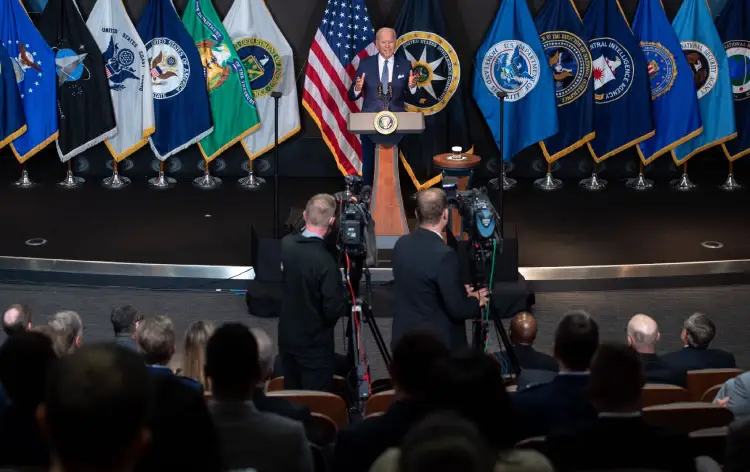
In a speech to US intelligence agencies this week, US President Joe Biden said that cyberattacks could trigger the next kinetic warfare between major foreign powers. The comment was intended as a warning to Russia, experts told Tech Monitor, as pressure mounts on the Biden administration to stem the ongoing ransomware epidemic, which is largely attributed to Russian criminal gangs.

In his speech at the Office of the Director of National Intelligence on Tuesday, Biden warned “if we end up in a war, a real shooting war with a major power, it’s going to be as a consequence of a cyber-breach”.
The speech marked an escalation in rhetoric against Russia, says Joyce Hakmeh, senior research fellow at think tank Chatham House. “The escalation in speech is to say that [Russia] has to be very careful about what it does,” she says.
Greg Austin, senior fellow for cyber, space and future conflict at the International Institute for Strategic Studies, agrees. “I think that there is increasing evidence of a much harder position coming out of the US administration – that we would have imagined on day one of this administration.”
This hardening stance follows the ongoing spate of ransomware attacks that have claimed multiple high-profile US organisations as victims. This has put pressure on Biden to address the issue, says Hakmeh. “Cyberattacks in the US have escalated the attention to this issue from the president and his administration,” she says.
Research by security provider Digital Shadows has shown that many of the most prolific ransomware groups never target Russian organisations, a strong indication that they are based in Russia and seeking to avoid action from local law enforcement.
“These attacks have inflicted a lot of harm,” Hakmeh explains. “But the way in which technology will develop, the way in which cities will be interconnected, the consequences of these attacks will become even more dangerous, and can lead to loss of life. So there has to be an escalation and response.”
Biden made special mention of Russian President Vladimir Putin in his speech. “When I was with Mr Putin – who has a real problem – [...] he’s sitting on top of an economy that has nuclear weapons and oil wells and nothing else. Nothing else. Their economy is – what? – the eighth [...] largest in the world? He knows – he knows he’s in real trouble, which makes him even more dangerous in my view.”
“He is saying, ‘We know what you’re doing’ and ‘you don’t have much’,” says Hakmeh. “Let’s not forget that the US is one of the biggest cyber powers, if not the most advanced. So he’s saying that they have the capabilities and the tools and the capacity. And he would not shy away from responding in case [Russia] will cross that line [once] more.”
Will this rhetorical approach spur the Kremlin to crack down on cybercrime? Unlikely, says Hakmeh. “Historically speaking, naming and shaming doesn’t really work with Russia,” she says. “On the contrary, you can argue that naming and shaming is something that they are after because it shows that they are a powerful foe.”
Kremlin spokesperson Dmitry Peskov responded to Biden’s speech in a conference call with reporters yesterday. “It is clear that such bold statements are in demand among this audience, but it is also obvious that the president is voicing the messages that are being prepared by his staff and his assistants,” he said. “And here we can clearly see that there is a wrong knowledge and understanding of modern Russia.”
Russian interference in the 2022 US midterm elections
Elsewhere in his speech, Biden accused the Russian government of spreading misinformation online ahead of the 2022 US midterm elections, calling it a “pure violation of our sovereignty”.
This suggests that the Biden administration is preparing to take action, says Austin. The US “must now be preparing to escalate retaliatory measures against Russia because Biden told them in June that such activities were completely unacceptable”, he says.
Peskov also rejected the claims that Russia is attempting to spread misinformation about the 2022 US midterm elections. “Russia has never interfered in the US electoral processes. The results of many investigations conducted in the US confirm that Russia has never interfered. Russia certainly does not and has no intention to meddle in some electoral processes abroad.”
After a summit in June, where Biden identified 16 areas of infrastructure that should be “off limits” to cyberattacks, Putin said his “American sources” have clarified that most cyberattacks are “carried out by the US”, followed by “Canada, Latin America and Great Britain […] Russia is not even on the list”, Putin said, calling on the US to “get rid of insinuations and accusations”.
Earlier this year, a process initiated by Russia led to a surprise agreement between UN member states on state-backed cyberattacks. Russia, China and Iran had called for a new treaty on cyberattacks, arguing that the current system of international law favours the US and its allies. This was rejected in favour of a non-binding agreement.
Although this agreement is non-binding and unlikely to prevent any cyberattacks, experts were surprised that any diplomatic agreement could be reached. Since then, however, diplomatic solutions to growing tensions in cyberspace have looked increasingly unlikely.






